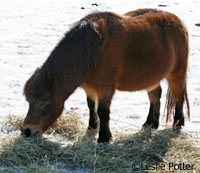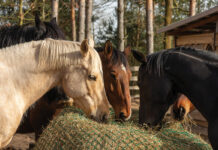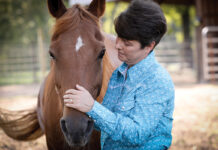 With cold weather right around the corner, the grass is dying off and truckloads of hay are being delivered for the winter. The change in seasons also brings a change in your horse’s nutritional needs, so make sure you’re prepared for the months ahead.
With cold weather right around the corner, the grass is dying off and truckloads of hay are being delivered for the winter. The change in seasons also brings a change in your horse’s nutritional needs, so make sure you’re prepared for the months ahead.
- It’s easier to keep weight on a horse in the winter than to have him gain it once he’s gotten skinny. An extra layer of fat before the cold months arrive will make it easier for horses to keep weight on in the cold. If your horse has a full winter coat, you can’t monitor his weight purely by eye; be sure to use your hands to regularly feel along his ribs, which you should be able to feel only faintly.
- The digestion of fiber (hay) in your horse’s digestive tract creates heat that will help keep him warm. Make sure he has plenty of hay to munch on all day if you live in a cold climate.
- Buy hay as early as you can, since the prices get higher as winter goes on. If you don’t use very much, check into splitting a bulk shipment with a buddy for even better pricing.
- If your horse has plenty to eat but still loses weight in the winter, add 4 to 8 oz. of corn oil to his regular grain meal for extra calories.
- For horses that live outdoors, provide a large round bale (in a rack feeder to prevent wastage) for them to “graze” on and stay busy.
- Fresh, clean water is important all year long. Use bucket or tank heaters and check them daily to make sure the water remains unfrozen. Horses prefer drinking water that is 45 to 65 degrees Fahrenheit. A horse that doesn’t drink enough in the winter is at risk of impaction colic.
- Making a mash by mixing two gallons of hot water into your horse’s pelleted or concentrate feed and allowing it to expand for 15 minutes before feeding will help provide extra hydration. But skip the bran. Read more on feeding bran mashes here.
- Make sure your horse is dewormed according to the schedule recommended by your veterinarian before winter arrives to kill any parasites that might prevent optimum digestion.
- If your horse is older and has poor teeth that can’t process hay, you can feed soaked alfalfa cubes or hay pellets in large servings several times a day to help keep him in good weight.
- Don’t forget the salt! Free access to a trace mineral salt block is required to meet your horse’s requirements for sodium and other minerals, especially for horses eating hay but not grain.






I will be using these
These are excellent tips for all types of horse care environments. Appreciate the general overview before the cold sets. Thank you.
You need to take care of them well they want get sick, love on them like they are part of your family. If they are on a diet you have to give them deit food. They need to run around outside, learn how to do jump up above the tree when it’s liedown on the ground
great! tips will be glad to pass them on.
great ideas!
Thank you! The corn was a very good idea 😀
Very helpful and clearly explained
great information! Thanks!
Great tips! For those of us feeding large round bales check out theroundbaleguardian.com works super thanks
Great tips.
My horse seems to get thinner and her hips begin to show when she has no access to grass, regardless of the routine of alfalfa hay and sweet feed that she receives daily. So I was wondering if by feeding her spinach leaf bought from the supermarket would help with her joints being better lubricated as well as aiding her already healthy diet? thank you